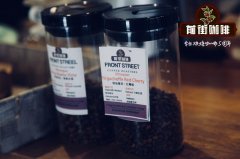Is there any coffee producing area in Yemen? is the most famous Yemeni coffee mocha coffee?

Professional coffee knowledge exchange more coffee bean information please follow the coffee workshop (Wechat official account cafe_style)
From the beginning of coffee history, the status of Yemeni coffee is world-famous, with the same origin as Ethiopia's coffee genealogy.
The complete preservation comes from the ancient varieties spread in Ethiopia, and the endemic coffee varieties that have gradually developed so far are all Arabica "adzuki beans".
Close to the capital Haraz, Bani Matar Bani Mattar (Mattari), Haima (Al-Khaimah) several producing areas, coffee beans are always known as "Shanani" Sanani, the harvest period is mainly from October to December, local farmers harvest 3 times 4 times a year by hand.
The real mocha Matari, the coffee beans produced in the Bani Mattar region, are extremely high in circulation and high in price, and are sold under the name "Mattari".
Yemeni coffee has a unique and strong flavor, due to the desert climate and the lack of dry air. Coffee trees only grow in the "Wadi" of the high-altitude mountain area of Yemen (with an average elevation of 1000m to 2500m). They also use the slopes of the canyon to reclaim terraces to grow coffee.
With the exception of the rainy season, it is usually in a dry state, and at first glance the land feels very barren, but the water flowing under the riverbed can incredibly produce excellent coffee fruit. The Yemeni coffee beans produced are high-grade export products, picked by hand, combined with traditional sun-drying treatment, and removed pods with grindstone.
Interestingly, Yemen is not as used to drinking coffee as Ethiopia.
In the tradition of Yemen, the shell and pulp of dried coffee fruit are boiled into a drink called "Gishr". Ingredients such as bean curd or ginger will also be added to "Keesi" and then boiled into "Qahwa", which is the favorite drink of the local people.
It is precisely because everyone can use the pulp to make drinks, so the coffee trees do not spray pesticides, and the coffee fruits are quite safe and non-toxic.
This unique and reassuring Yemeni coffee will not let you down!
Important Notice :
前街咖啡 FrontStreet Coffee has moved to new addredd:
FrontStreet Coffee Address: 315,Donghua East Road,GuangZhou
Tel:020 38364473
- Prev

A brief introduction to the producing area of Baoshan Coffee in Yunnan Province
Professional coffee knowledge exchange more coffee bean information Please pay attention to the coffee workshop (Wechat official account cafe_style) recently roasted Yunnan coffee produced in Yunnan, China, found that the taste of Yunnan coffee has improved a lot with 10 years ago, can not help but curious to find its information, originally thought that Yunnan has many valleys and miasma legends, Yunnan traditional clothing is also half-long sleeves, judgment should be weft
- Next

What are the natural fermentation principles of cat feces coffee beans?
Professional coffee knowledge exchange More coffee bean information Please pay attention to coffee workshop (Weixin Official Accounts cafe_style)"We control which microorganisms are cultivated for our food." Indonesian civet coffee (also known as "cat feces coffee") is one of the most expensive coffee varieties in the world, selling for more than 1300 US dollars per kilogram. This pricing is based on
Related
- Does Rose Summer choose Blue, Green or Red? Detailed explanation of Rose Summer Coffee plots and Classification in Panamanian Jade Manor
- What is the difference between the origin, producing area, processing plant, cooperative and manor of coffee beans?
- How fine does the espresso powder fit? how to grind the espresso?
- Sca coffee roasting degree color card coffee roasting degree 8 roasting color values what do you mean?
- The practice of lattes: how to make lattes at home
- Introduction to Indonesian Fine Coffee beans-- Java Coffee producing area of Indonesian Arabica Coffee
- How much will the flavor of light and medium roasted rose summer be expressed? What baking level is rose summer suitable for?
- Introduction to the characteristics of washing, sun-drying or wet-planing coffee commonly used in Mantenin, Indonesia
- Price characteristics of Arabica Coffee Bean Starbucks introduction to Manning Coffee Bean Taste producing area Variety Manor
- What is the authentic Yega flavor? What are the flavor characteristics of the really excellent Yejasuffi coffee beans?

